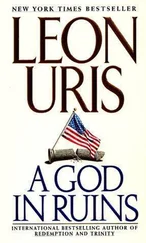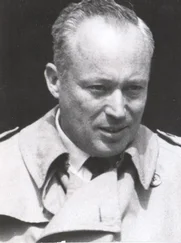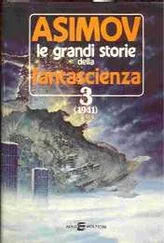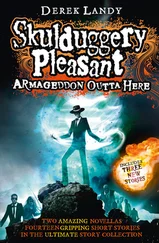Armageddon - Leon Uris
Здесь есть возможность читать онлайн «Armageddon - Leon Uris» весь текст электронной книги совершенно бесплатно (целиком полную версию без сокращений). В некоторых случаях можно слушать аудио, скачать через торрент в формате fb2 и присутствует краткое содержание. Жанр: Старинная литература, на английском языке. Описание произведения, (предисловие) а так же отзывы посетителей доступны на портале библиотеки ЛибКат.
- Название:Leon Uris
- Автор:
- Жанр:
- Год:неизвестен
- ISBN:нет данных
- Рейтинг книги:4 / 5. Голосов: 1
-
Избранное:Добавить в избранное
- Отзывы:
-
Ваша оценка:
- 80
- 1
- 2
- 3
- 4
- 5
Leon Uris: краткое содержание, описание и аннотация
Предлагаем к чтению аннотацию, описание, краткое содержание или предисловие (зависит от того, что написал сам автор книги «Leon Uris»). Если вы не нашли необходимую информацию о книге — напишите в комментариях, мы постараемся отыскать её.
Leon Uris — читать онлайн бесплатно полную книгу (весь текст) целиком
Ниже представлен текст книги, разбитый по страницам. Система сохранения места последней прочитанной страницы, позволяет с удобством читать онлайн бесплатно книгу «Leon Uris», без необходимости каждый раз заново искать на чём Вы остановились. Поставьте закладку, и сможете в любой момент перейти на страницу, на которой закончили чтение.
Интервал:
Закладка:
Was not the Legend of Rombaden in fact the story of the German people?
He began to thumb through the thin book for clues, passages to clarify a hundred hazy thoughts. And then, nagging unanswered questions began to be answered with a strange clarity.
When he had been in college and was chosen for military government, there had been endless arguments and discussions about the German mind. Scholars and practical men argued logic and theory, and then, at a certain point in every discussion, all logic about the German people dissipated into confusion. The German always ended in a cloud of mystery ...the eternal enigma.
But here, in Hinterseer’s pages, the German showed himself. Here was Siegfried! Here in the Legend of Rombaden was that longing to be the super race! Here was that strange elation at the moment of death so prevalent in the German culture! Here was the hero’s reward for death in battle!
In the legend they looked upon themselves as the “chosen” people of God. But, what kind of a god? This was not the God of Jesus Christ! The god that they longed to identify themselves with was a pagan god! Wolfram was a god who lived in the forest and was more animal than human!
Did not the Germans, indeed, identify themselves more with the pagan than with monotheism, the Western concept of one God? Sean pondered. Once he had written what was termed a brilliant paper, on the “Origins of Anti-Semitism in the German Mind.” By chance, General Hansen, in his search to find German experts, read the paper. It was this paper by an obscure political-science instructor at the University of California which brought Sean O’Sullivan into military government before the age of thirty.
Sean now tried to link his paper to the Legend of Rombaden. He had written:
No people in all of the Western world live closer to their mythology than the German people. Siegfried and other legendary figures, particularly warriors, are deep within the soul of the German people.
The German people have identified themselves indelibly with the forest, with nature, and with animals. This powerful lure of the forest has given vent to the mysticism that always follows “forest people” and a relationship to animals peculiar to them.
Take, for example, the German hunting rituals. After an animal has been slain, the German hunter cuts the throat with a special knife. The “Forest Master” dips a stick into the animal’s blood and anoints the hunter’s forehead. The stick is a pure phallic symbol and the purpose of the ceremony is to endow the hunter with the potency and power of the animal he has just slain ...just as Siegfried bathed in the blood of the dragon he had killed.
The Jews gave to the Western world a formal conception of one God. The Jews handed down from Sinai the basic “laws” or rules of Western morality, the Ten Commandments.
The German hates both the one-God concept and the stringency of the “laws” in his subconscious mind. On the surface and to the world at large he is both a Christian and a product of Western culture.
However, he is a split personality. Another part of him, a vital part of his soul, remains in the forest. The German is, therefore, civilized in much the same way as a domesticated animal, for part of the German is always animal.
Despite his trappings, part of the German is pure pagan. In order for the German to become the pagan his unconscious desires he must throw off the formal concept of one God, and God’s laws. Therefore, the German must destroy the Jew, who stands between him and his pagan desires.
Sean always felt that Germans hated Jews because they wanted to return to the forest. He felt the Germans loved their warrior gods; the Berwins and the Siegfrieds and identified with them more than they loved Christ and more than they identified themselves as Christians. Sean knew the old thesis that to be truly anti-Jewish, one must be anti-Christ. When you destroy the Jew, you also must destroy Christ. Therefore, the German protests Christianity by destroying the Jew.
A doctor of the mind would call the German a schizophrenic. He is, in truth, two distinct people.
One part of this two people gave man its highest and most enriching contributions to civilization through the Beethovens and Bachs and Kants and Schillers and Freuds and Mozarts and Goethes.
But the other! The hate-filled and muddled ramblings of Nietzsche and of Schopenhauer and of Hegel, of Treitschke and Fichte. And the staggering genius of Richard Wagner whose magnificent sounds extolled the glory of death, the fatherland, the chosen people ... chosen of pagan gods. And who is to say that Wagner is not part and parcel of the soul of the German people?
Adolf Hitler understood this desire for paganism in the German people and exploited it. The uniforms, the blood ceremonies, the rallies were nothing more or less than pagan rituals. Hitler deliberately played to the German people’s desire to identify themselves with paganism by the destruction of the Jews.
Hitler was indeed another pagan god, calling for the German people to destroy themselves in a death orgy and they answered with “sieg heil.”
Sean began to recall the ramblings of the sick philosophers. Schopenhauer ... the only honest wish man could have was that of total annihilation. Hegel, a personal beloved idol of Adolf Hitler who wrote ... the spirit dies in order to live and that he who yields himself in death is merely yielding one’s self to his other self for life is death; and Hegel wrote further that ... every state must accept the divine right of oppression that belongs to it as a necessary state in the evolution of government; Nietzsche ... I want to teach men the sense of their existence, which is the Superman, the lightning out of the dark cloud; Fichte, who named the Latins and French and Jews as subhumans, and Treitschke, who put the final amen on the German character ... it does not matter what you think as long as you obey.
So, it all fit together, Sean thought. The Legend of Rombaden had produced a magic key he had sought for years that explained the anti-God, anti-Christ, anti-Jewish perversion as a drive to return to paganism.
This, then, was the answer to Count Ludwig Von Romstein and the others who argued that the Nazi era was a unique phenomenon that resulted from the First World War and a set of following crises. This was a lie, for the roots of Nazism were deep within the hearts and minds of the German people, and all of it, Aryanism, paganism, love of death, the forest, superhumanism, had been part of them for centuries and centuries!
The Nazi era then was a combined will of most of the German people over hundreds of years of cultivation and growth. The drive toward self-destruction was inevitable!
To Sean, Hinterseer and the Legend of Rombaden even spelled out more. The startling discovery that the Germans worshiped death! The German approached death in a different manner than any other Western people, who either feared it or looked upon it as an end of mortal suffering. To the German, death alone was a state of existence more wonderful than life, and the moment of death was to be worshiped as the moment of supreme exaltation!
Did this not begin to give answers, that such a people were capable of running death factories in Dachau and Schwabenwald? If death is a desirable superstate in their mystic and pagan subconscious, then it is not a mortal “Christian” sin to commit murder.
Assembly-line death could only be accomplished by an astute Western mind. It could be “justified” when the pagan overwhelms the Christian morality. The split personality in the German character made it possible.
Hinterseer and Richard Wagner told a puzzled world about the perplexing contradictions in the German. And what is more, no one is more perplexed, searches more for his own identity, is more of an enigma than the German is to himself.
Читать дальшеИнтервал:
Закладка:
Похожие книги на «Leon Uris»
Представляем Вашему вниманию похожие книги на «Leon Uris» списком для выбора. Мы отобрали схожую по названию и смыслу литературу в надежде предоставить читателям больше вариантов отыскать новые, интересные, ещё непрочитанные произведения.
Обсуждение, отзывы о книге «Leon Uris» и просто собственные мнения читателей. Оставьте ваши комментарии, напишите, что Вы думаете о произведении, его смысле или главных героях. Укажите что конкретно понравилось, а что нет, и почему Вы так считаете.











